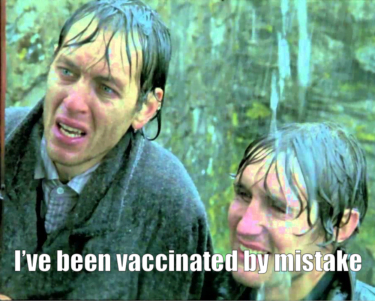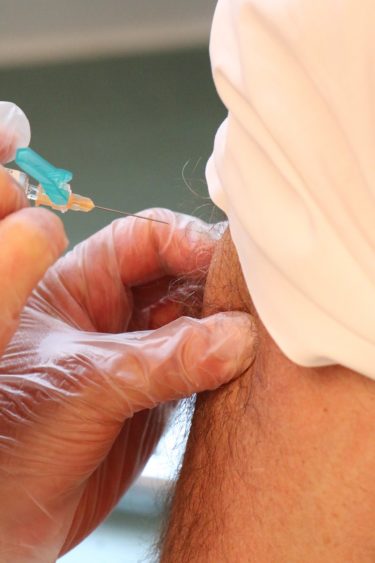On February 23rd, at 2pm, I received a text from my doctor:
Dear Mr Marshall. We would like to invite you to book your appointment for your COVID-19 vaccination. If you are able to, please click the link and make your appointment within the next 24 hours. If you can’t, don’t worry – the practice will contact you to arrange.
This was a surprise, to say the least, as a pretty healthy 37 year old. Having seen the UK government’s target to vaccinate all adults by July, I wasn’t expecting to be contacted until perhaps May or June. As many will know, the national vaccine rollout follows a priority list of at-risk groups, starting with care homes, the clinically extremely vulnerable, and people over the age of 80, then 75-79, then 70-74. I am, it’s fair to say, not one of those people.
As keen as I was to be vaccinated, I also had no wish to jump the queue, or to be vaccinated ahead of someone who really, really needed it. But the “make an appointment in the next 24 hours” line seemed important: the Pfizer vaccine (which they’ve been using here in Liverpool) has to be stored frozen, and once the whole batch is thawed you’ve got to use it up. I’d read about vaccine units being thrown away because they’d expired, and I assumed that might explain their urgency to vaccinate someone – anyone – with the supply they had that day.
With that in mind I booked the soonest slot that was available – 4.40pm the same day, at a vaccine centre a 15 minute drive away, figuring that if I booked the earliest slot I could, I’d minimise the chances of a vaccine dose going to waste. I posted on social media about it, and saw a couple of other people, some from Liverpool, some not, in the same boat: healthy, reasonably young, invited to be vaccinated with the Pfizer vaccine at the last minute.

There was even news coverage of the phenomenon, in iNews, who found a handful of identifiable cases like mine (including mine!), even though the official guidance is to only fill those last-minute appointments with people from the priority groups. When approached for a comment, Dr Mary Ramsay, Head of Immunisations and countermeasures at Public Health England, suggested this was happening to counter waste, and that she “thinks it is very unusual.”
As news of the unusual, outside of the schedule vaccinations like mine spread across the media, various fixes have been proposed, including an NHS England source telling iNews:
“some people may not be aware of [their] medical conditions or may not realise it puts them in the vaccination priority group and they urged them to contact their GP to raise their concerns if they have any.”
While coverage in the Sun suggested vaccine centres should check ID to ensure people are eligible for vaccination:
“If a practice has invited anyone in error the appointment should be withdrawn, with ID checks happening in local areas to ensure that people who are currently eligible are vaccinated.”
However, I’m not convinced that the solution to this issue is to require photo ID in order to receive a vaccine, nor is it to have patients query their vaccine eligibility by calling their doctors. For one, the people least likely to have photo ID – such as a passport or driving license – are likely to be from particularly vulnerable groups. What’s more, it should not be the job of the staff of the vaccination centre to verify your eligibility – making it their responsibility will only slow down what is currently, and necessarily, a very smooth, efficient system. If your name is on their list, and you’ve turned up, you should get vaccinated. Anything which turns away people at the door of the vaccination centre merely increases the chances that a vaccine will go to waste.
As for calling your doctor to check your eligibility, my instinct is that this will cause more harm than good. As iNews reported, some of these patients did call their doctor to check, only to be told to go ahead with the appointment anyway. This actually makes some sense: when you call your GP surgery, it’s unlikely that the person answering the phone will have the time or access to check your full medical record to ensure you’re eligible for a vaccine. It’s likely that for such a check to take place, you’d need to be put through to a doctor or nurse, who would then go through your records to ensure you really don’t have something in there that would require a vaccine. Whatever time that takes is time that staff member isn’t seeing patients, and the only potential saving is that you move further back the vaccination queue, while the NHS looks to reallocate your appointment. For appointments that are just hours away, there’s a chance that slot won’t be filled, and a vaccine will go to waste.
On the other hand, allowing the erroneous invite guarantees the vaccine will be used, saving the NHS staffing time, at no real risk to the patient – the ‘error’ here isn’t that a patient is given medication they don’t need, it’s that they’re given a vaccine they need earlier than they have been allocated it. It might actually be counter-intuitively more efficient for the NHS to keep those admin-error invites, even in comical circumstances, like the 32 year old whose height had been misrecorded, leading to medical records showing his BMI was 28,000.
The UK has been administering up to 400,000 vaccines per day. If we take a rough estimate as to how many are admin errors or out-of-schedule invites to the healthy-but-available, I’d be surprised if it were as high as 1,000 per day – which would represent a fraction of 1% of vaccines administered. Of those people, some will receive the text, won’t have heard the message to assume it’s a mistake, won’t check with their GP, and will get vaccinated a few months early. Some will call their GP to check, and will be told to take the appointment anyway, for the reasons outlined above – so they’ve taken up a bit of time with their doctor, only to carry on regardless.
Some will check with their GP, find they’re an error, and as advised will cancel their appointment, leaving the NHS to re-fill their slot. Perhaps for their appointment that will be easy to do, especially if they’ve booked days in advance, but for those like me who were offered a slot with less than 3 hours notice? It’s less likely that those last-minute slots will be filled if people call up to check first.

Looking at those assumed 1,000 ‘errors’ per day, maybe as many as half would be cancelled, allowing 500 more higher priority patients to be invited; of those maybe as few as 20 slots will go unfilled, and those 20 vaccines thrown away. These are just reasonable guesses – they may be way out.
But let’s now look at the eligible invitees – essentially the other 399,000 out of 400,000 per day. Some of those people will know they need the shot. Others will have carers who know it. They will carry on with their appointment as normal. But there will definitely be some people who see the advice that “the invitation texts might be sent by mistake – call your doctor first to check”, and they’ll do just that. What percentage of those 399,000 people per day would need to make calls before there are tens of thousands of extra calls to the NHS? Each of which require time to manage, to go through medical records, and to confirm that the patient was indeed eligible after all.
Some of those calls won’t get answered – when they don’t, some of those eligible, at-risk people will not get the vaccine at that invite. Others won’t even pick up the phone to make the call, they’ll remember that they read that there were problems with the texts, and they will assume theirs is one of the errors. Some of the conditions that qualify a patient as at-risk include mental health issues – it’s not hard to believe that adding a “phone your doctor first to check” stage to the vaccine appointment will be an unnecessary barrier for some people. This is especially true of the vaccine hesitant: if you’re on the fence already, having to make a phone call first might be just the little nudge you need to make you not get the vaccine.
In talking about how best to deal with these ‘errors’, it’s important to consider what could be the impact of encouraging the public to doubt their eligibility for the vaccine, for those 399,000 eligible vaccinations per day, and whether that loss would be more or less than the 480 or so vaccines we might reallocate by having patients check they are not a clerical error.
It is better that a small number of people get vaccinated early than we give anyone who is hesitant a reason not to take it, or anyone who is struggling a barrier to getting it.
Ultimately, the solution to this is issue cannot rely on patient behaviour. If there are issues with priority ordering, and with NHS trusts deciding how to use up their vaccine doses at the last minute, that has to be on the experts at the NHS and Public Health England to sort out. If that means rescinding erroneous invitations, and ensuring a more robust system in future, that’s absolutely fine; but it’s vital that the messaging to the public is clear, and that there is no doubt in patients’ minds that their invitation to be vaccinated is appropriate. It is better that a small number of people get vaccinated early than we give anyone who is hesitant a reason not to take it, or anyone who is struggling a barrier to getting it.
Designing the immunisation system, and ironing out the bumps in the admin, absolutely cannot rest on patients questioning their own eligibility. Giving patients cause to doubt might stop some of the ‘unusual’ outlier cases like mine, but will almost certainly result in fewer eligible patients getting the vaccines they need. I’d much rather twenty, fifty, even a hundred people are vaccinated a bit early than for a single vaccine to be thrown away.
In short, as far as I’m concerned, if you’re offered the vaccine and you’re able to take it, you should take it as soon as you possibly can.



